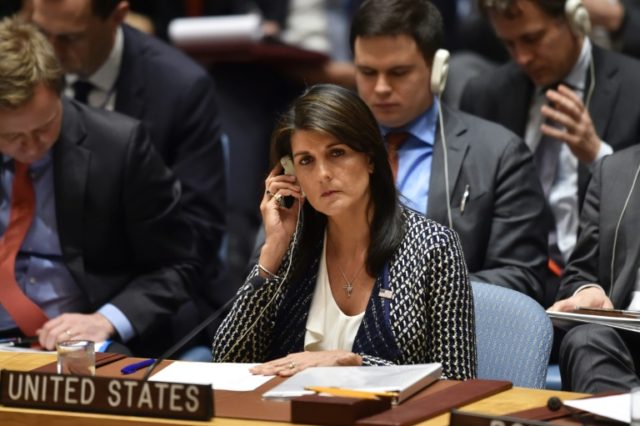Paris (France) (AFP) – As the US and France threaten retaliation against the Syrian government over the latest suspected chemical attack in the country’s seven-year war, legal experts say the two countries risk breaching international law in order to uphold it.
President Emmanuel Macron said Thursday that France had “proof” that Syria’s Bashar al-Assad crossed his long-stated “red line” by using a gas to attack the rebel-held city of Douma last week, which NGOs say killed at least 40 people.
He and his American counterpart Donald Trump — who warned that missiles “will be coming” — have held talks over how to respond.
Washington and Paris say the chemical attack in Douma is a clear violation of the Chemical Weapons Convention (CWC), which Syria signed in 2013 as part of Russia-brokered deal to eliminate such arms.
But “the violation of conventions doesn’t give you the right to use force,” said Francoise Saulnier, legal director of Doctors Without Borders.
Under United Nations rules, military force is allowed under just three conditions: legitimate self-defence, at the request of the country where it would occur, or in case of Security Council authorisation.
Russia has systematically used its Security Council veto to block any move against Syria, which it has backed since 2015 when it helped Assad turn the tables against opposition forces.
As a result, Western officials are instead pressing a moral argument, saying Assad must be stopped from using particularly cruel and outlawed weapons.
“UN resolutions have been taken, and today we might be outside the framework of these resolutions, but we are within the framework of international law: This dictator is murdering his own people,” said Jean-Jacques Bridey, head of the French parliament’s defence commission, adding that the planned strikes would be “morally legal”.
– ‘Smokescreen’ –
But resorting to such arguments is risky, analysts say, since they could open the door to the unilateral use of force in any number of situations — in particular regimes who have already shown little regard for international law.
“Legal morality is an absolute trap, because what’s moral for you isn’t for me,” said Didier Billion of France’s Institute for International and Strategic Affairs.
“What would give France and the US the right to bomb a state?” he said, dismissing their arguments as a “smokescreen”.
For Patrick Baudouin, a lawyer with the International Federation for Human Rights in Paris, “it’s breaking international law with the goal of ensuring it is respected.”
“It’s the idea that there is some sort of international humanitarian law based on a ‘responsibility to protect’. But this isn’t something laid down in international law.”
Saulnier at Doctors Without Borders agreed that such notions were “empty concepts” that could backfire.
“What’s dangerous is that the West, already waging a war against non-state actors in Syria, is risking an escalation toward international conflict in order to potentially get back to the negotiating table” for ending the seven-year civil war, she said.
But by trying to get around the established rules on using force, “we’re liquidating the legal structures built since World War II,” Saulnier said, warning of a return to “gunboat diplomacy”.

COMMENTS
Please let us know if you're having issues with commenting.